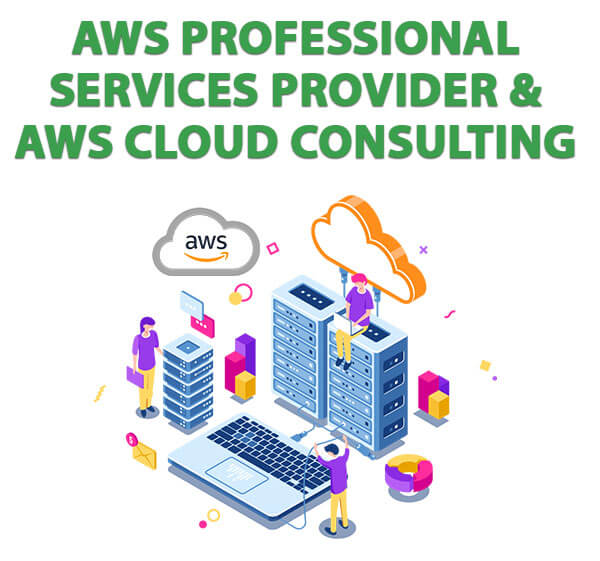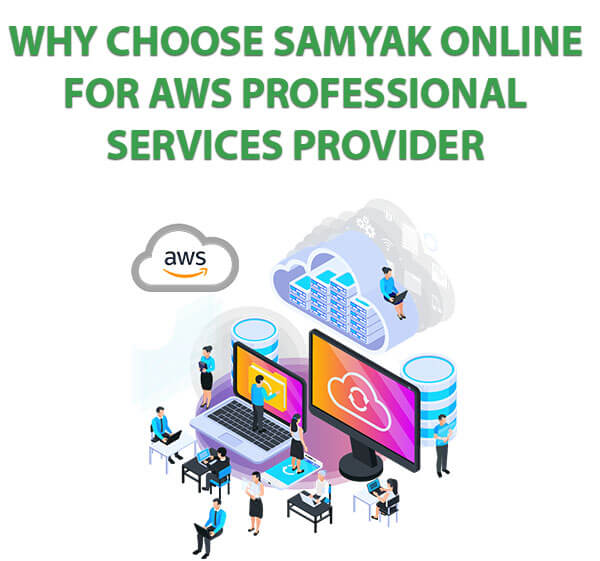Amazon CloudFront is a globally distributed content delivery service that helps accelerate the delivery of static, dynamic, and streaming content to end users. It securely delivers data, videos, applications, and APIs with low latency and high transfer speeds by caching content in edge locations strategically placed around the world.
AWS Professional Services


AWS Professional Services Provider & AWS Cloud Consulting
Amazon Web Services (AWS), an extensively adopted revolutionary cloud-based platform, enables businesses to improve competence by using it’s range of products and solutions based on futuristic emerging technologies. More than 200 AWS featured solutions cover different business aspects. Samyak Online offers comprehensive tailor-made AWS solutions and AWS support services to help businesses to lower costs by being more agile, faster innovator, and better performing.
Hire AWS Developer
- End-To-End Solutions On AWS
- AWS web server consulting for performance audit, AWS integration, configuration, cost optimization
- On account & infrastructure level AWS cloud security
- AWS Cloud Migration
- AWS Database Migration
- AWS products specific service and support for –
- Amazon SNS integration and configuring
- AWS Cloudfront Setup integration and configuring
- Amazon Simple Email Service (SES) integration and configuring
- Amazon Lightsail integration and configuring
- Amazon Elastic Compute Cloud (EC2) integration and configuring
- AWS Certificate Manager (ACM) integration and configuring

Why Choose Samyak Online for AWS Professional Services Provider
Our AWS managed services ensure uninterrupted business operations powered by ‘Service Level Agreements’ (SLAs) and 24×7 proactive support to tackle performance issues. Our objective-oriented AWS services help you reduce operation costs, improve performance, respond faster, and to deliver in less time. AWS experts at Samyak Online have proven expertise and capabilities to manage complex deployments successfully. The other reasons that make Samyak Online the best choice for hiring AWS experts are-
- The best IP Security, data protection, and confidentiality
- The pool of experienced certified AWS developers with a specific skill
- Years’ experience in online project management
- Facility to cancel the contract any time with a month’s time notice
- Daily reporting with direct communication
- Reliable Data backup and restoration
FAQs
Amazon CloudFront works by caching and serving content from edge locations, which are AWS data centers located in various geographic regions. When a user requests content, CloudFront automatically routes the request to the edge location closest to the user, reducing the latency and improving the performance of content delivery. If the requested content is not available in the edge location, CloudFront retrieves it from the origin server, caches it in the edge location, and serves it to the user. CloudFront also supports advanced features such as SSL/TLS encryption, custom domain names, and dynamic content delivery.
There are several benefits to using Amazon CloudFront:
- Improved performance: CloudFront helps deliver content with low latency and high transfer speeds, resulting in faster load times and improved user experience.
- Global coverage: CloudFront has a large number of edge locations around the world, allowing for global coverage and reduced latency for users in different regions.
- Scalability: CloudFront automatically scales to handle varying levels of traffic, making it suitable for websites with varying levels of content delivery requirements.
- Cost-effective: CloudFront offers pay-as-you-go pricing with no upfront fees, making it cost-effective for businesses of all sizes.
- Security: CloudFront supports SSL/TLS encryption, allowing for secure content delivery, and integrates with other AWS services for enhanced security features.
- Customization: CloudFront provides customizable options such as custom domain names, caching settings, and distribution settings, allowing users to tailor content delivery to their specific requirements.
Amazon CloudFront supports various types of content, including static content (such as images, CSS, JavaScript files), dynamic content (such as APIs, personalized content), streaming media (such as audio and video), and software downloads. CloudFront can be used to deliver content for websites, web applications, mobile applications, gaming, and other use cases.
To set up Amazon CloudFront, you can follow these general steps:
- Create an Amazon CloudFront distribution in the AWS Management Console or using the AWS CLI/API.
- Specify the origin server(s) from which CloudFront should fetch the content. This can be an Amazon S3 bucket, an EC2 instance, an Elastic Load Balancer, or a custom origin.
- Configure the settings for the CloudFront distribution, such as caching behavior, SSL/TLS settings, and custom domain names.
- Optionally, set up CloudFront access controls to restrict access to your content based on various criteria, such as IP addresses or signed URLs/cookies.
- Once the CloudFront distribution is created and configured, you can use the CloudFront domain name (e.g., d12345kj2n3o4.cloudfront.net) or your custom domain name to serve your content.
Amazon SNS is a fully managed messaging service that enables you to send messages or notifications to distributed applications or systems. It provides instant, scalable, and cost-effective communication across a wide range of endpoints, including email/SMS, mobile push notifications, HTTP/HTTPS, AWS Lambda, SQS, and more.
Amazon SNS allows you to create topics, which are communication channels to send messages to. Publishers send messages to these topics, and subscribers receive these messages. Subscribers can be applications, services, or other AWS resources. SNS supports a variety of protocols, including email/SMS, mobile push notifications, HTTP/HTTPS, Lambda, and more, making it flexible for different types of communication scenarios.
Amazon SNS can be used in various use cases, including:
- Application and system notifications: Send notifications to applications or systems when events occur, such as sending email alerts, SMS notifications, or mobile push notifications.
- Fanout messaging: Broadcast messages to multiple subscribers, such as sending updates to multiple devices or services in real-time.
- Application-to-application messaging: Integrate different applications or services by sending messages between them using SNS as a mediator.
- Distributed event-driven architectures: Use SNS as a messaging backbone for decoupled communication between different components or microservices in a distributed system.
- Monitoring and logging: Send notifications or alerts based on system events or logs to monitor and troubleshoot applications or systems.
Amazon SNS follows a pay-as-you-go pricing model, where you are charged based on the number of messages published, the number of messages delivered to subscribers, and other optional features you may use (such as SMS notifications). There are no upfront fees or minimum charges for using Amazon SNS, and you can view your usage and costs in the AWS Management Console or through AWS Cost Explorer.
Amazon SNS stores messages redundantly across multiple availability zones within a region to ensure high durability and availability. Messages are retried automatically if delivery fails, and SNS supports multiple protocols and transports, such as email, SMS, mobile push notifications, HTTP/HTTPS, Lambda, and more, to ensure reliable and flexible message delivery. SNS also provides dead-letter queues for failed deliveries, allowing you to automatically route failed messages to an Amazon SQS queue or an Amazon S3 bucket for further analysis or processing.
Amazon Certificate Manager (ACM) is a fully managed service that makes it easy to provision, manage, and deploy SSL/TLS certificates for use with AWS services and internal resources. ACM eliminates the need to manually generate, manage, and renew certificates, making it convenient and cost-effective to secure your applications and websites with HTTPS.
ACM supports three types of SSL/TLS certificates:
- Public certificates: These are used to secure domain names that are publicly accessible on the internet, such as websites or APIs that are accessed by external clients.
- Private certificates: These are used to secure domain names that are not publicly accessible on the internet, such as internal applications or resources within a Virtual Private Cloud (VPC).
- Wildcard certificates: These are used to secure multiple subdomains under a single domain, such as *.example.com, making it cost-effective and convenient for securing multiple resources or applications.
You can use ACM certificates with a wide range of AWS services, including but not limited to:
- Amazon CloudFront: For securing content delivery over HTTPS.
- Amazon API Gateway: For securing APIs with custom domain names.
- Elastic Load Balancing (ELB): For securing load balancers and applications running on EC2 instances.
- AWS Elastic Beanstalk: For securing applications deployed on the Elastic Beanstalk service.
- Amazon CloudFront: For securing content delivery over HTTPS.
- AWS CloudFormation: For provisioning and managing SSL/TLS certificates as part of infrastructure as code deployments.
To request and manage certificates with ACM, you can follow these general steps:
- Request a certificate: You can request a certificate for a domain name or a wildcard domain name in the AWS Management Console, AWS CLI/API, or using the ACM SDKs.
- Domain validation: ACM automatically validates your domain ownership by sending validation emails to registered domain owners or by adding validation records to your DNS configuration.
- Deploy the certificate: Once the certificate is issued and validated, you can deploy it to AWS resources such as CloudFront, API Gateway, ELB, or Elastic Beanstalk, or download it for use with other non-AWS resources.
- Certificate management: ACM automatically manages certificate renewals and updates for you, eliminating the need for manual certificate management. You can also use the ACM console, CLI/API, or SDKs to view, delete, or import certificates.
ACM is a free service provided by AWS. There are no charges for issuing, renewing, or managing certificates with ACM. However, there may be charges associated with using ACM certificates with other AWS services, such as CloudFront, API Gateway, ELB, or Elastic Beanstalk. You can refer to the AWS Pricing documentation for more details on associated costs.
Yes, ACM takes the security of your data seriously. ACM encrypts your SSL/TLS certificates and private keys using AWS Key Management Service (KMS) and stores them securely in AWS-managed hardware security modules (HSMs). ACM also supports certificate revocation and provides APIs and permissions-based access control to manage certificate permissions. Additionally, ACM follows AWS compliance standards and undergoes regular audits to ensure the security and compliance of the service.

